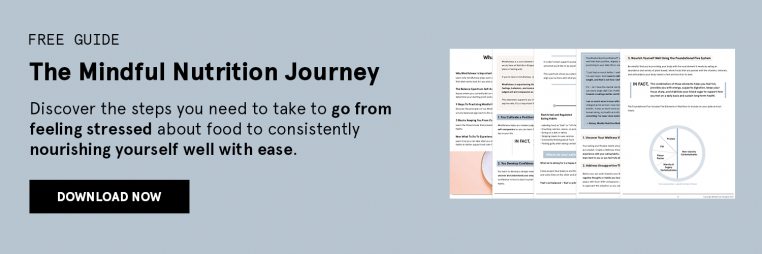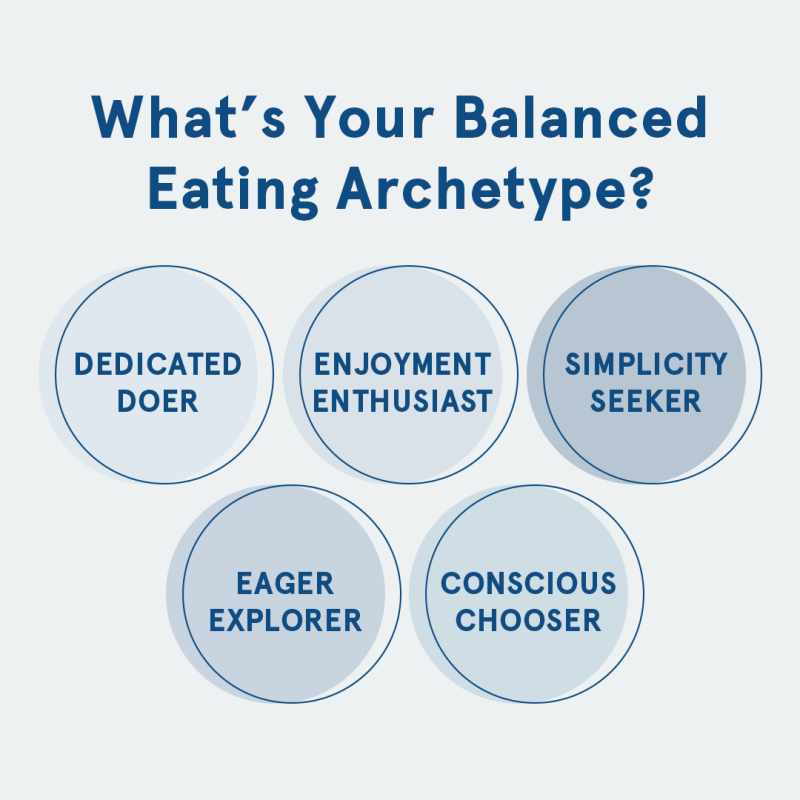Learn how to get trusted nutrition advice that’s appropriately applicable to you, and what you should steer clear of.
When you’re on a new wellness journey, it can be so fun to seek out nutrition advice by following a bunch of Instagram accounts, reading all the articles available, and staying up to date on the latest trends.
But with so much information out there, it’s so easy to feel overwhelmed and confused. Over time, it can even cause you to become obsessive, feel as though you need to strive for perfection, or jump from one trend to another. Ultimately, never truly finding balance.
If this sounds like you, know that you’re absolutely not alone! And know that you’re not stuck in this position.
There is a way to navigate information with confidence, to know what is best for you and your unique needs. To know what will best serve you and what information or practices are best to let go of because they’re not aligned with you.
When you’re able to look at nutrition information and advice through this lens and ask yourself — will this support my body, my lifestyle, and the vision I have for myself in the long-term — you’ll be able to go down a much more intentional, healthy, and long-lasting path.
So let’s dive into exactly what questions to ask yourself when exploring nutrition advice, so you can experience this confidence and ease.
5 Questions To Ask Yourself To See If You Should Listen To That Nutrition Advice
Being intentional is key. When looking at new information, you want to think first about yourself, what you’re seeking and what you need from this nutrition information. As opposed to letting the compelling nature of the information suck you in.
No matter what nutrition advice you seek, there are a few simple questions you can ask yourself. These questions will streamline your decision-making process! You’ll immediately know whether or not to buy into a trend or follow a new diet.
Here is what you need to keep in mind to see if this is really worth your time, energy, and resources.
1. What do You Want To Achieve By Absorbing This Nutrition Information?
The most important thing to consider on your wellness journey is your wellness vision. Oftentimes, this simple goal is overlooked.
Your wellness vision is what you want and desire your life to look like. It’s your all-encompassing, “end-game” wellness goal if you will. A detailed vision and compilation of overarching goals. How you would ideally design your life — from how you feel, think and act to how you show up daily. It may even outline what you may do throughout the day, from the moment you wake up to the moment you fall asleep.
On a deeper level, it allows you to explore your wants, desires, and core needs without judgment or external pressure.
But most importantly, it includes why you want those things.
When you have a detailed vision of wellness, it’s easy for you to filter nutrition and wellness information. You only focus on the things that align with what you want to experience. You’re better able to decipher what will support you and what will not.
Once you have a wellness vision created, you can then ask yourself if the nutrition advice you’re hearing aligns with it.
2. What is Your Intention for Wanting to Listen to That Nutrition Advice?
With your wellness vision in mind, start by asking yourself the following, “What is your intention behind wanting to try that advice?”. This is often the most important question to consider.
With full honesty, pause and reflect, “Is this something I want to try?”, “Why do I want to try this and what is my motivation behind it?”.
Is it because it’s aligned with your wellness vision? Or, is it simply because you’re being “influenced” by the touted benefits that someone else boasted about? Because a few people online look like they’re “thriving” on it?
I’m all about “guinea pigging” things to see what works and what doesn’t work. I did this for years in graduate school as a way to explore and discover certain foods and ways of eating to determine what agreed with my body and optimized my health, as opposed to those that didn’t.
But, I tested the things that I truly thought would support my wellness vision. Such as giving up 3 cups of coffee a day and replacing them with herbal tea, or reducing my stress by upping my meditation game.
The most important thing here is to ask yourself if this advice will support your wellness vision. If yes or you think so, then try it out. If not, there’s no need to move forward.

3. Is The Nutrition Advice Coming From a Credible Source?
In my opinion, this is the most important question to ask yourself in the health and wellness field.
Many of the things you see online today are just social media trends. They don’t have any data to back up their claims, or studies to show the long-term impact.
Seek out valuable resources that share evidence-based research and references. Listen to practitioners and experts who are accredited and licensed. Read their articles and blog posts, and utilize trusted resources like examine.com for supplements/trends, and one of our favorites, Healthline.
Always, always, go to the source of the nutrition advice! Who started this trend? Why did they start it? What’s their background? What research do they provide? Do you intuitively trust this person or align with them?
With the growing influencer space, is this person paid to say this? Are they honestly and with integrity sharing with you that they are commissioned to work with that brand? Are they partnering with so many other supplement brands, for example, at the same time? How trustworthy are they?
Play detective and advocate for yourself. Because if you don’t, who will?
4. Is it Something You Can Sustain for the Long-term?
We say this all the time here at Nutrition Stripped, but the feasibility of sustainability and consistency is key for lasting behavior change.
The next question to ask yourself is whether or not you can see yourself practicing this advice for 12-months and beyond. I emphasize the long game so much because it’s so important!
Remember, health is a daily practice. It’s a marathon, not a sprint.
It comes down to figuring out if this trend is worth putting your resources, time, and energy into to support your long-term health. If it’s only focusing on your short-term health, you’re doing yourself a disservice. You’re not thinking about the long game as you deserve.
If it feels restrictive, too challenging, or simply not suitable for your lifestyle, you likely won’t be able to maintain it.
5. Should This Advice be Guided by a Professional?
A lot of the advice out there is meant to educate you on the options that are available, but not all of that advice is meant for you to utilize and apply on your own. Much of the advice out there is intended to be used under the guidance of a licensed professional, like the Mindful Nutrition Method Registered Dietitians and wellness coaches here at Nutrition Stripped.
You can schedule a free Discovery Call to learn about our coaching here.
For example, a FODMAP elimination diet is often used for a short period of time for people with severe digestive issues. However, so many people try this on their own and end up feeling frustrated, lost, and overwhelmed.
The nutrition advice out there dooesn’t teach them how to utilize the diet appropriately, it simply educates them that the option is available. People attempting this diet on their own really don’t know how to conduct it safely, how to make sure it doesn’t feel restrictive, or how to translate the results into a long-term way of eating.
For some people with digestive issues, the FODMAP elimination diet may not be the best approach.
It’s so important to consider whether or not the nutrition advice you’re taking and applying is something that’s manageable on your own. If the advice is more complex and should be done with the support of a professional, be sure to seek one out.
Putting This Into Practice
The next time you’re trying to decipher if the nutrition advice you just read or heard is something worthwhile, pull up this list of questions and use them to guide your decision.
Remember, it’s more important to create a few strong habits and practices that support you for the long term than it is to try a bunch of things that never truly stick.
Ditch The Guessing Games And Find A Way Of Eating That’s Unique And Right For You
Here at Nutrition Stripped, we don’t believe in a one-size-fits-all approach to nutrition advice. We believe each individual deserves to learn how to meet their needs.
Our Mindful Nutrition Method teaches you how to do just that. The Mindful Nutrition Method™ is a transformative online live experience with live group coaching, training, and course materials, as well as a private community.
Inside we teach our students how to create balanced eating habits for life that help you free yourself from food and diet obsession, maintain a balanced weight, cultivate a positive relationship with food, and ultimately find joy in nourishing yourself.









